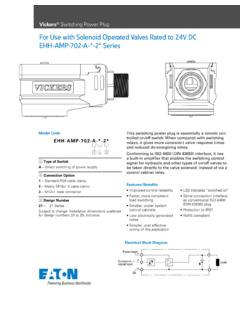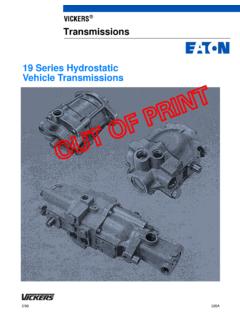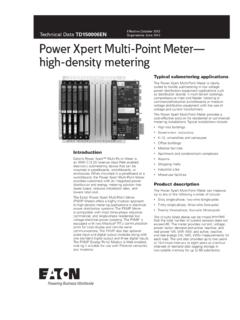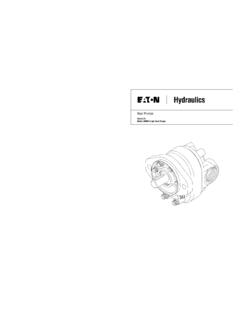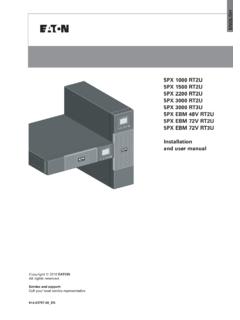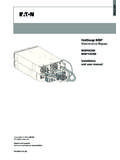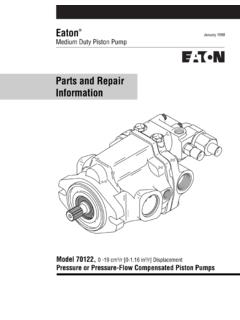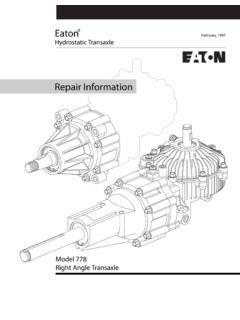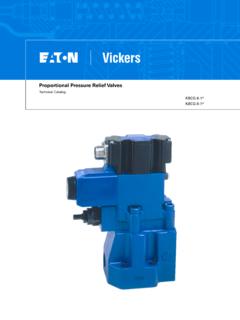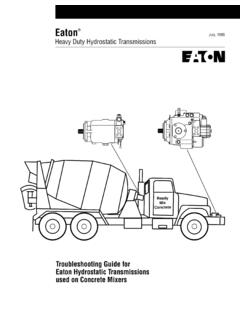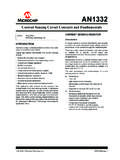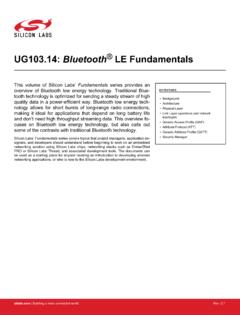Transcription of Eaton UPS fundamentals handbook
1 The Eaton UPS and power management fundamentals handbookMay 2020 Handbook2 Eaton UPS and power management fundamentals handbook Introduction 4 Questions to consider 5 Top UPS design considerations 6 Other UPS design considerations 8 Automatic transfer switch configurations 9 Six considerations to achieving generator-UPS harmony 10 How to size a UPS 11 Head-to-head UPS comparison for network closets and server rooms 12 UPS cost justification worksheet 13 UPS form factors 14 Input plugs and output receptacles 15 The difference between VA and watts 17 9 ways beer and UPSs are alike 18 UPS startup 19 UPS vs.
2 Surge suppressor 20 Decentralized or central UPS? 21 Make giving your UPS a health check-up a top priority 23 What is three-phase power ? 24 Increase server energy efficiencies by using high-voltage power supplies and 208V UPSs 25 Worldwide voltage map 26 Worldwide voltages 27 The nine power problems 28 UPS topologies 29 UPS battery overview 30 Factors affecting battery life 32 Transform your power infrastructure with lithium-ion batteries 33 UPS software overview 34 Typical PDU configurations with UPS models 35 Service overview 37 Electric transmission distribution system 38 Frequently asked questions 40 Commonly used acronyms 42 Glossary of power terms 44 Table of contents3 Eaton UPS and power management fundamentals handbookIntroductionWelcome to the Eaton UPS and power Management fundamentals handbook . From plug and receptacle charts and facts about power problems to an overview of various UPS topologies and factors affecting battery life, you ll find a wealth of pertinent resources designed to help you develop the optimum solution.
3 This handbook is your one-stop source for essential information .. whether you need power protection for small, medium or large data centers; health care facilities; or other environments in which ensuring uptime and safeguarding data are a UPS?In general, a UPS protects IT equipment and other electrical loads from problems that plague our electrical supply, performing the following three basic functions:1. Preventing hardware damage typically caused by surges and spikes. Many UPS models continually condition incoming power as Preventing data loss and corruption. Without a UPS, devices that are subjected to a hard system shutdown can lose data completely or have it corrupted. In conjunction with power management software, a UPS can facilitate a graceful system Providing availability for networks and other applications while preventing downtime. In some cases, they provide enough battery runtime to ride through brief outages; in other cases, they provide hours of runtime to ride through extended power outages.
4 UPSs are also paired with generators to provide enough time for them to power I SPEND MY TIME FOCUSING ON WORLD YOU ADOPT US? WE'RE A SOLID to Eaton , IT pros are spending fewer nights and weekends at work, leaving their desk toys at the office all UPS and power management fundamentals handbookQuestions to considerWIND ME UP AND I'LL PROGRAM YOUR DATA CENTER TO RUN it comes to backup power , here are some basic questions to ask yourself. Application1. How often do you refresh and maintain your IT hardware (including servers)? What about your UPS equipment?2. If you have a converged data-voice network, have you protected all critical switches?3. If you have virtualized your servers, have you considered the impact on your UPS equipment?4. What would happen if the power went out at your facility right now?5. Have you thought about the impact of damaged or corrupted data?6. How much energy do your UPS units consume? How efficient are they?
5 UPS specifics1. What size UPS do you need? (kVA or amperage)2. What voltage is currently available at your site?3. What voltage do you need?4. What runtime do you want?5. Are there any clearances or size constraints?6. Do you have bypass requirements?7. What types of input and output connections are required?8. Is there a generator on site?9. Does the UPS need to be scalable?10. Do you need redundancy?Accessories1. How is power getting from the UPS to your equipment?2. Do you have a need for enclosures, communications, seismic mounting, floor stands or rail kits?3. Is a maintenance bypass switch needed?4. Are unorganized cables hindering your efficiency or coming a safety concern?Software and connectivity1. Is there a need to have orderly scheduled shutdowns?2. Do you want to remotely monitor the UPS?3. Would you like to remotely notify others of UPS events?4. How will your UPS software manage virtual servers during an extended power outage?5.
6 Does your power management software integrate easily with your virtualization platforms?6. Do you need a network card? A network card that has the UL 2900-2-2 cybersecurity certfication?Service1. Do you need immediate factory response?2. What kind of parts and labor coverage do you need?3. Do you want any type of preventive maintenance?4. When s the last time you checked the batteries in your existing UPS units?5 Eaton UPS and power management fundamentals handbook1. power environment: single- and three-phaseUnderstanding your existing power infrastructure is a crucial step in the qualification and sales process. While you may focus on larger, three-phase power systems, the majority of IT managers are dealing primarily with single-phase equipment, often at the rack existing computer rooms and small to mid-sized data centers have single-phase loads at the rack level. Ground-up designs are increasingly moving three-phase power to the point of utilization to gain efficiencies and reduce costs, creating great opportunity for three-phase solutions in new construction.
7 2. Installation environmentIt s imperative to understand how a prospective UPS will be deployed. Since most environments support several different solutions, you may need to evaluate these power loadThe VA or watt rating of your power loads is one of the most important factors in identifying the right UPS. After identifying the power environment (if the UPS needs to be single- or three-phase), the size of the UPS further narrows the selection. In single-phase deployments especially, it often makes sense to select a UPS that exceeds current power requirements but offers greater runtimes and allows for future Availability and battery runtimeThis is where you need to determine your true runtime requirements. While runtime may seem like a simple thing to quantify, understanding the facts behind the numbers help contribute to the development of end-to-end , the amount of runtime required can significantly affect the solution cost, but many Eaton solutions are actually more cost-effective in extended runtime are four basic battery runtime configurations:1.
8 UPS with 10 to 15 minutes of runtime and no generator. You are covered for 90 to 95 percent of power outages. You can either use UPS shutdown clients to save your data or stay online as long as possible before the system UPS with 10 to 15 minutes of runtime and a generator. You have a very reliable setup and most generators will startup within one minute (five minutes maximum). You are covered for most Redundant UPSs, generator and two power feeds for dual-corded servers. You have a lot of money and/or are really worried about the power failing. It's time to get a consultative person on-site to help you figure it UPS with two or more hours of battery runtime. In some cases, generators may not be practical and you must rely entirely upon IT PRO SAYS Eaton HELPS HIM TRIM THE FAT. FRANKLY, I'M A LITTLE UPS design considerationsThe following factors outline the key design considerations to take into account when analyzing your UPS and power management fundamentals handbook5.
9 Form factorHow much space are you willing to designate to your UPS? Where do you plan to install it? Answering these questions will help you determine whether your environment is better suited for a tower or rackmount model. Some UPSs have a 2-in-1 form factor, allowing you to deploy the unit either way. 6. ScalabilityIt s always important to consider your future expansion needs when evaluating solutions. Eaton s scalable UPS solutions provide a competitive advantage by offering a cost-effective way to increase capacity. Virtually all Eaton UPSs with a 6 kVA or greater power rating offer some form of scalability, either through a simple firmware upgrade, the addition of modular hardware components or the paralleling of multiple UPSs. For cost-conscious or budget-constrained customers, a UPS with inherent scalability often proves to be the best value in the long run, allowing you to increase capacity without purchasing additional hardware. A simple kVA upgrade is all that s needed to enable a UPS with inherent scalability to operate at full capacity.
10 You may want to service the UPS yourself. If that s the case, look for a unit that allows you to add capacity with power and/or battery modules. While modular solutions including multiple, paralleled systems are often a more affordable option initially, they can be a more expensive solution over the long term due to added hardware and installation costs. Depending on your needs, a larger, centralized, non-modular system with inherent scalability might ultimately be the most cost-effective power distributionIt is important for you to consider how power will be delivered to your critical equipment. In some cases, you may simply plug loads directly into the UPS. In others, you may need large PDUs to distribute power . You may also incorporate rack-based power distribution units into your ManageabilityWhile a UPS protects the attached load during a power outage, power management software is required to ensure that all work-in-progress is saved and that sensitive electronic equipment is gracefully shut down if the power outage exceeds the battery runtime of the UPS.
